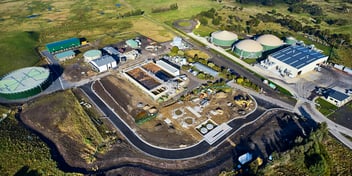Yarra Valley Water takes net-zero emissions pledge
Yarra Valley Water is among the first water utilities in the world to sign the global Pledge to Net Zero as part of its work to generate renewable energy and reduce greenhouse gas emissions.
Pledge to Net Zero marks a commitment to achieve net zero carbon emissions by 2050. It’s been established to support the United Nations Race to Zero campaign, which rallies leadership and support for the transition to a net zero carbon economy.
Yarra Valley Water Managing Director Pat McCafferty said the pledge reinforced the organisation’s commitments to go beyond zero carbon and create a brighter future for the community and environment.
“Climate change is the defining issue of our time and we’re proud to be leading the way in reducing our greenhouse gas emissions with ambitious targets that go beyond compliance,” Mr McCafferty said.
“We’re already committed to generating 100% renewable energy by 2025, and we’re halfway towards achieving this goal with 50% of our operations now powered by renewables.
“We’ve achieved this through leading projects like our food-waste-to-energy facility at Wollert, which converts about 30,000 tonnes of food scraps into more than 7,000,000 kWh of clean energy a year. We’ve also installed solar panels at our head office and treatment plants and we’re members of Zero Emissions Water which purchases energy in bulk from Victoria’s largest solar farm.
“We’re working on how we will accelerate our progress to hit net zero by 2025, and then using the offsets we generate to go beyond zero-carbon to address legacy emissions.”
Looking to 2025
McCafferty said new projects, including the development of a second food-waste-to-energy facility and expansive new floating solar installations, would help Yarra Valley Water reach its goal of 100% renewable energy by 2025.
Yarra Valley Water is a member of Leading Utilities of the World, a global network of the world’s most innovative water utilities, which is encouraging members to make the Pledge to Net Zero.
Organisations making the pledge agree to publicly report greenhouse gas emissions, publish a paper each year outlining ways to achieve net zero carbon or support smaller signatories to set and meet their targets.
Mr McCafferty said making the pledge highlighted how the path to net zero can be achieved by partnerships on a global scale.
“We all need to do our bit to decarbonise our fuel to meet global climate change targets,” he said.
“The Victorian water industry is impacted by climate change while also being a major consumer of power. We’re committed to advancing commercially viable projects that benefit the environment.”

